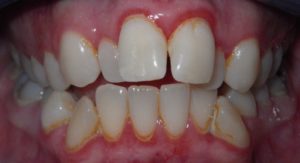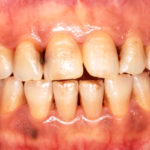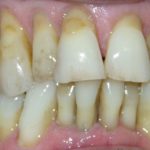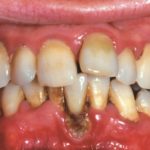What is gum recession?
Are your gums receding? Gum recession is usually defined as a process in which the gum line around the teeth, which holds the teeth in its places, starts wearing off and pulling away from the teeth. If your gums are receding that there is a high probability that you might get gum disease. When gums recede, they start to form pockets and gaps which accumulate more bacteria whenever you eat food, these bacteria excrete acids. In the case of receding gums, bacteria have better access to the ligament of the teeth, which increases chances of serious tooth problems.
Gum recession is one of the most common dental problems and most people don’t even know they have it, this is because it occurs really gradually and slowly. Initial signs of recession in gums are:
- A tooth with a receding gum line may appear longer
- Discolored gums
- Cavities on teeth around the gum line

Why do gums recede?
There are a number of reasons for receding gums, the most normal ones include:
Gum Disease
Gum disease is a major reason for gum recession. This usually happens when bacteria start to develop in your mouth after every time you eat. These acid-producing bacteria gradually destroy the gum tissue and bone holding the teeth in place creating gaps around teeth which accumulate more bacteria.
Hormonal Imbalances
Fluctuations or changes in hormone levels in men during puberty and in women during pregnancy or menopause might result in gum recession and problems.
Genes
Some people are naturally more prone to gum diseases, their immune system maybe genetically weak. These increase the chances of bacteria affecting the gums and in worst cases, patients might experience tooth loss at an early age.
Forceful Tooth Brushing
Brushing teeth with hard tipped brushes and with excessive force might also cause recession, as this not only weakens the gums but also results in the loss of natural tooth enamel, making teeth more prone to be attacked by bacteria. Always use a soft brush and brush gently in circles.
Tobacco Use And Smoking
It is commonly known that people who are habitual of chewing tobacco products and people who smoke excessively often get gum disease. Tobacco doesn’t only stain the teeth but keeps damaging the gums slowly, making the weak and more prone to infections. Serious tobacco users also have lesser chances of getting a successful treatment.
Grinding Teeth
If you are habitual of grinding your teeth, Stop! Grinding your teeth puts extreme pressure on your teeth and gums. This pressure moves the roots of teeth, gradually creating spaces and gaps in the surrounding gum line.
Uneven Bite
Having genetically crooked teeth is really harmful to the gums and should be fixed with the right treatment. Crooked teeth result in a misaligned bite, this exerts unbalanced pressure on your teeth every time you chew something , creating gaps in the gum line and slowly pulling it away from the teeth.



Piercings
Piercings on your lips or on your tongue are really harmful to your teeth and gums. Even the slightest contact with the jewelry might prove harmful as it might cause irritation and irritated gums are weak gums, more prone to wearing off around the gum line.
Inadequate Dental Care
Having poor dental hygiene habits can be a huge problem your teeth in the long run. It is advised to brush your teeth at least twice a day because that is the only way you can lower the chances of getting an infection. Not flossing also results in plaque buildup between the teeth and around the gums.
Can My Receding Gums Be Treated?
Fortunately, mild recession can be treated with a single visit to the dentist. The dentist might use procedures like scaling or root planing.
This involves deep cleaning the teeth, plaque and tartar buildups are cleaned and the root surfaces below the gum line are carefully exposed and smoothed. This makes it difficult for bacteria to stick to your teeth and roots.
What Do I Do If I Have Extremely Receded Gums?
If you have highly irritating gums or you feel as if your teeth are becoming longer, then you might require a visit to a Periodontist and possibly, a gum surgery. These are some of the gum surgery methods your doctor would suggest depending on your condition.
Bone Regeneration
If the bone supporting your teeth has substantially eroded or receded, the dentist would advise you to go for a Bone regeneration surgery. This involves deep cleaning of the teeth and roots by folding back the gums, then a regenerative material like a tissue-building protein or a membrane is applied to the affected area. This allows your body to naturally regenerate the bone and tissue loss in the gums.
Pocket Reduction
This procedure involves folding back the gum line at the affected tooth and deep cleaning the bacteria and harmful infections, after which the gum tissue is placed back in its position, this causes the pocket or gap size to effectively reduce.
Tissue Graft
This procedure normally involves the extraction of tissue from the palate in your mouth which is then stitched to the affected gum line and naturally it heals to reduce the pocket size greatly. If there is enough gum tissue in your mouth, the dentist might extract some of it instead of the palate. The procedure is similar, the affected area is cleaned and the tissue is stitched to provide a pocket less gum line.
Tips To Prevent Gum Recession
In most cases, gum recession can be extremely painful and irritating it is better to be careful and be able to prevent it:
- Eat a healthy and balanced diet which include lots of vegetables and enough of proteins
- Brush and floss regularly as this is the best way to stop gums from receding
- Quit smoking or chewing tobacco products and lower the intake of high sugar drinks like soda
- Observe and monitor any changes you see in your mouth
- Visit a dentist at least twice a year for checkups
Start caring for your teeth and gums today, come and visit our practice for a consultation to find out the best way to take to care of your smile!
